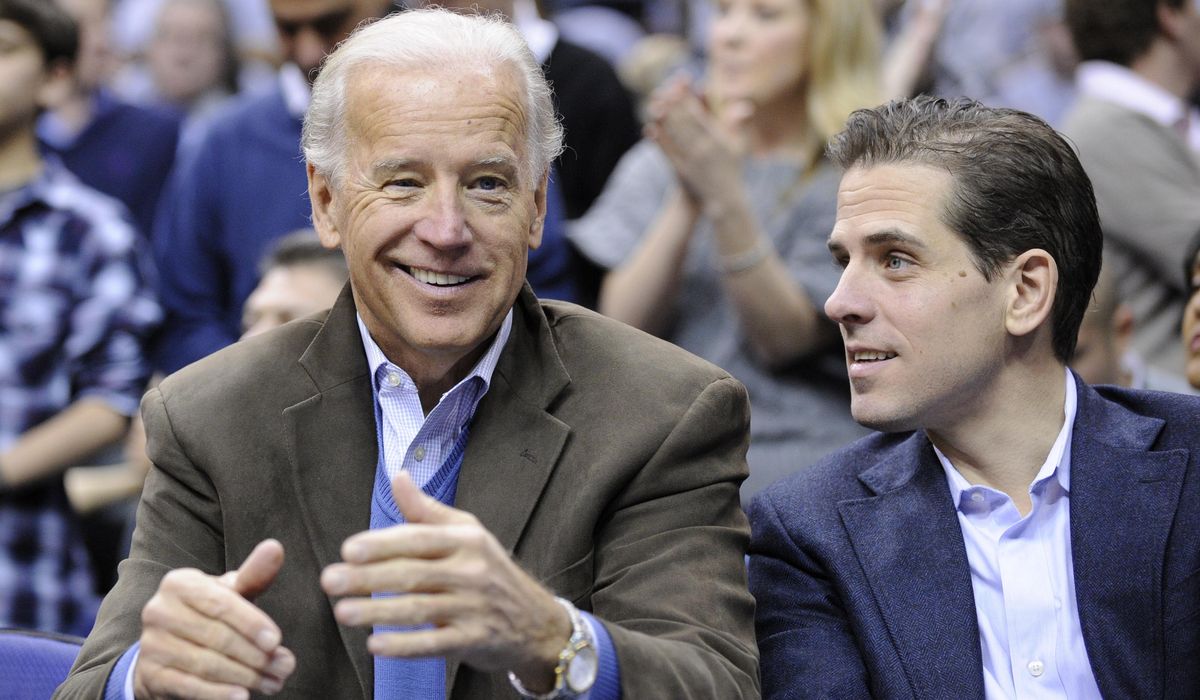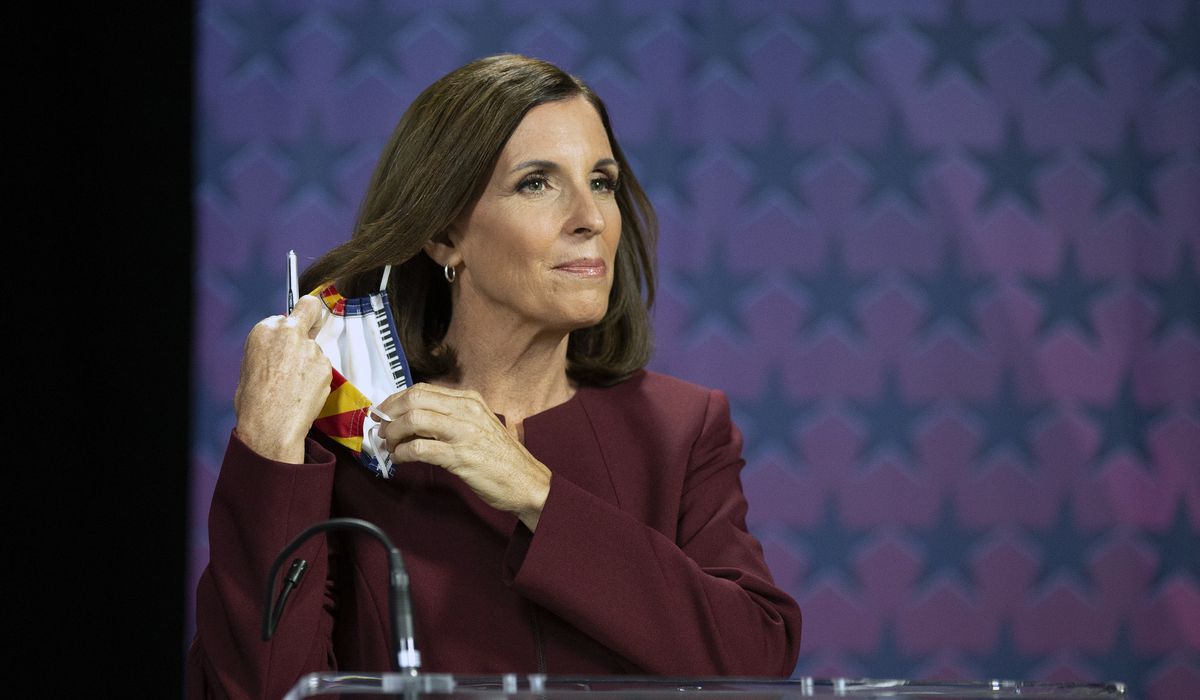
It’s rare for people in Hollywood to miss a chance to take a bow, but those who made “America’s Forgotten,” a documentary film on illegal immigration, prefer to remain anonymous.
“Due to possible political backlash all credits have been voluntarily withheld by the crew of this film,” a disclaimer says as the documentary begins.
Director Namrata Singh Gujral appears at first blush to have bulletproof credentials in Hollywood. She is a successful immigrant who describes herself in “America’s Forgotten” as “a fervent Democrat.” Her next project is a film looking at organ and bone marrow transplants in ethnically diverse communities.
Although any movie featuring migrants who enter the U.S. illegally is sure to draw the ire of most liberals, Ms. Gujral declares early in the movie that it is “neither Republican nor Democrat,” and those seeking a partisan take “should look elsewhere.”
Ms. Gujral said she had an epiphany on immigration last summer when, in India working on a separate documentary, she dutifully tuned in on her laptop to a Democratic presidential primary debate in June 2019.
Two moments startled her. One was when candidate Julian Castro cited a horrific incident in which Oscar Martinez and his daughter, Valeria, drowned in the Rio Grande while trying to sneak into the U.S.
The second was when the Democratic presidential candidates on the crowded stage were asked whether their plans would provide free health care for life for undocumented immigrants. All of the candidates, including eventual nominee Joseph R. Biden and his vice presidential choice, Sen. Kamala D. Harris of California, raised their hands.
Ms. Gurjal was horrified by the Martinezes’ fate and angered by what she saw as the Democrats’ encouragement of illegal immigration. Each of those snapshots led her to another discovery that inspired “America’s Forgotten,” which began streaming Oct. 16.





While she searched for information about the Martinez drownings on the internet, she also found the story of a 6-year-old Indian girl named Gurpreet Kaur who died from dehydration in the Arizona desert. When she started looking into the thousands of Indian businesses, many unregistered, purporting to offer easy access into the U.S., she saw the Democratic debate as a selling point.
“The unscrupulous coyotes urging people to immigrate illegally from India literally have a clip of that debate moment on their iPhones,” she said. “Free American health care? For the rest of your life? Who doesn’t want that?”
Nevertheless, as an immigrant herself, Ms. Gujral insists she did not approach “America’s Forgotten” intending to make a documentary about the negative impact of illegal immigration. Instead, that was what she learned in the process.
She knows the film will not sit well with her peers.
“A friend of mine, a pretty big name who helped me edit the movie, said, ‘Why are you doing this? Why don’t you just walk away?’” she recalled. “And I replied, ‘Why not tell the story that you see through your lens rather than the one that’s in your head?’”
The documentary mentions the ancestral roots of Ms. Gujral, 45, in Pakistan and those of her husband’s in Scotland. At the outset, she expresses sympathy for those who seek “asylum” in the U.S. and asks, “Most of us wouldn’t be here if America closed her doors then, so why should we want them to close her doors now?”
Ms. Gujral was born to conservative Sikh parents in Dharamshala, a town in India’s northern Himalayan foothills, not far from where the girl who perished in Arizona, Gurpreet, also hailed.
Although figures on illegal immigration are by definition imprecise, Ms. Gujral said, she found that people from South Asia, which she defined as India, Pakistan and Sri Lanka, comprised the second-largest group, after Hispanics, crossing the southern U.S. border.
Although the U.S. may seem like a beacon for those in poverty, Ms. Gujral found that many Indians pay $50,000 to $75,000 per person for what turns out to be a bogus pathway to America.
“What you find with those suffering truly abject poverty is they are thinking about their next meal, their next possible money — much more pressing things,” she said. “They aren’t thinking about America at all.”
The movie shows adorable Indian children, barefoot among broken rocks, rickety outhouses and piles of refuse, who have no clue what America means.
One child posits that America is the girl who delivers papers in his neighborhood. Another said it is “the place where Princess Diana lives.”
Ms. Gujral imagines Gurpreet coming from such a situation, but her investigation leads her to a provocative question about who is immigrating from that part of the world.
“Are they really the poor, huddled masses yearning to be free?” she says in the film’s narration. “The coyotes are selling a warped version of America to their victims.”
Maybe not.
The man believed to be Gurpreet’s father, who lives in an upper-middle-class neighborhood, cuts off the conversation when asked whether it was “poverty or persecution or violence” that motivated the girl’s family to make the desperate attempt.
Others who tell stories include Maria Garcia, who arrived in the U.S. from Puerto Vallarta, Mexico; Jonathan Decoster, who served as a Marine in Iraq, and his wife, Amanda Shryock; and Sabine Durden-Coulter, a woman whose son, Dominic, was killed by an illegal immigrant driving in California.
Ms. Garcia’s tale is a horror show of rape and abuse handed out by what she calls “a cartel” masquerading as an immigration service. They held her hostage and extorted more and more money from her before eventually trying to bring her across the border in a locked car trunk.
“America’s Forgotten” concludes that, for many, the surprisingly large sum of money they expend on their illegal odyssey isn’t worth it.
When asked why she chose a grim framework of criminal abuse within the immigration world rather than success stories, Ms. Gujral offered two responses. One is that the focus on illegal immigration is bound to swim in some nasty waters. The other is that she feels these stories go unreported in American media that often appear to advocate for open borders.
“There are plenty of positive stories,” she said. “What was lacking, I felt, was a clear-eyed look at the costs. That’s not reflected in your everyday media channels.”
The experiences of the immigrants affected almost everyone involved in the film, the anonymous movie laborers who chose not to affix their names for fear of career blowback, Ms. Gujral said.
“A year ago, I was very anti-separating mother and child, or families,” she said of U.S. policy that began during the Obama administration but first received withering coverage under President Trump. “But it also gets to a point where you have to ask: At what point does the mother bear some responsibility? Why is she subjecting the children to this ordeal by trying to get in illegally?”
With her international experience, Ms. Gujral said, she is familiar with the long lines outside many U.S. embassies, where the immigration offices are clogged with people trying to get visas.
Those images, with her family’s immigration journey when she was 14, influenced her thinking. She remains an unvarnished supporter of the United States and expressed bewilderment that so many successful Indian Americans she knows harbor left-wing views.
“I know racism exists in this country, but I never really experienced it,” she said. “And I ask these people with great houses, driving Mercedes-Benzes, ‘What racism lies behind your great success? How do you square your life with the idea America is some hopelessly racist country?’”
Whether “America’s Forgotten” is a career killer for Ms. Gujral remains to be seen. She said some have already “unfriended” her on Facebook and she now senses hostility in Hollywood circles where she once found affection.
Also unclear is what impact the film may have on her next project on transfusions, titled “Finding Matches,” which was inspired by personal experience with cancer.
What is clear is that “America’s Forgotten” echoes Ms. Gujral’s philosophy of life and art: “You must always be willing to truly consider evidence that contradicts your beliefs and admit the possibility that you may be wrong.”